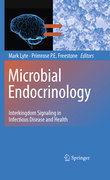
Microbial endocrinology: interkingdom signaling in infectious disease and health
Lyte, Mark
Freestone, Primrose P.E.
Microbial endocrinology represents a newly emerging interdisciplinary field that is formed by the intersection of the fields of neurobiology and microbiology. This book will introduce a new perspective to the current understanding not only of the factors that mediate the ability of microbes to cause disease, but also to the mechanisms that maintain normal homeostasis. The discovery thatmicrobes can directly respond to neuroendocrine hormones, as evidenced by increased growth and production of virulence-associated factors, provides for a new framework with which to investigate how microorganisms interface not only with vertebrates, but also with invertebrates and even plants. The reader will learn that the neuroendocrine hormones that one most commonly associates with mammals are actually found throughout the plant, insect and microbial communities to an extent that will undoubtedly surprise many, and most importantly, how interactions between microbes and neuroendocrine hormones can influence the pathophysiology of infectious disease. The first comprehensive book in the field of microbial endocrinology Provides new insight into the interactions between microbes and hormones Research into this area has widespread implications for medicine and industry, including drug development INDICE: Development of the field of Microbial Endocrinology from the early20 th century to present.- Iron-related mechanisms of catecholamine-induced effects in gram-negative and gram-positive bacterial pathogens.- Dietary catechols and their role in food-borne infectious disease.- The role of the stress-related catecholamines in quorum sensing by Escherichia coli O157:H7.- The presence and role of neuroendocrine hormones in the plant kingdom.- Stress, immunefunction and bacterial translocation in the gastrointestinal tract.- The roleof microbial endocrinology in periodontal disease..- In vitro experimental design concepts in microbial endocrinology investigations.- Molecular profiling of catecholamine modulation of gene expression in enteropathogenic bacteria.- Stress neurochemicals and their ability to alter susceptibility of chickens toinfection with Campylobacter jejuni.- Microbial endocrinology and its relevance to clinical practice.- The evolution of catecholaminergic systems in cell to cell signaling: from bacteria to humans.- Catecholamine stress hormone modulation of enteropathogenic bacteria interactions with gut mucosa.- Actions of biogenic amines on gut bacteria and the intestinal mucosa: contributors to enteric infection?- Modulation of pathogenicity with norepinephrine related to theType III secretion system of Vibrio parahaemolyticus.- Modulation of infectious agents in plants by neuroendocrine hormones.- Detection of neurotransmitteramines in microorganisms with the use of high-performance liquid chromatography.- Index.
- ISBN: 978-1-4419-5575-3
- Editorial: Springer
- Encuadernacion: Cartoné
- Páginas: 400
- Fecha Publicación: 17/05/2010
- Nº Volúmenes: 1
- Idioma: Inglés
